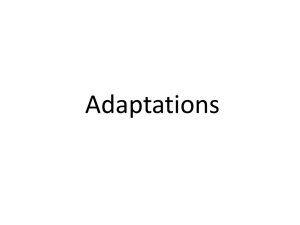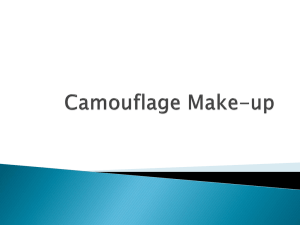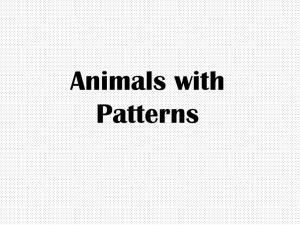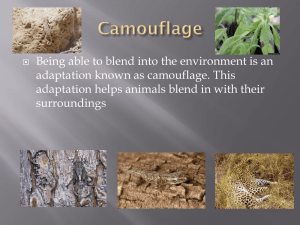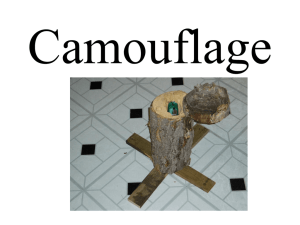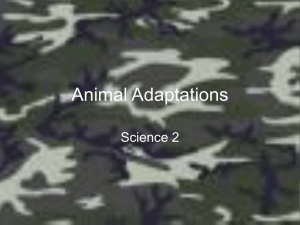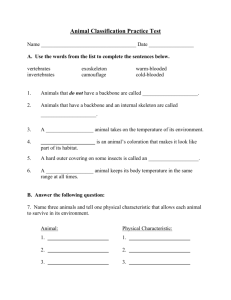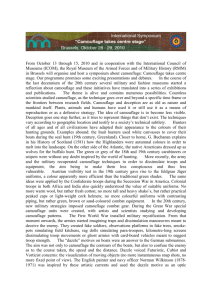Session 04a - Hamilton Trust
advertisement
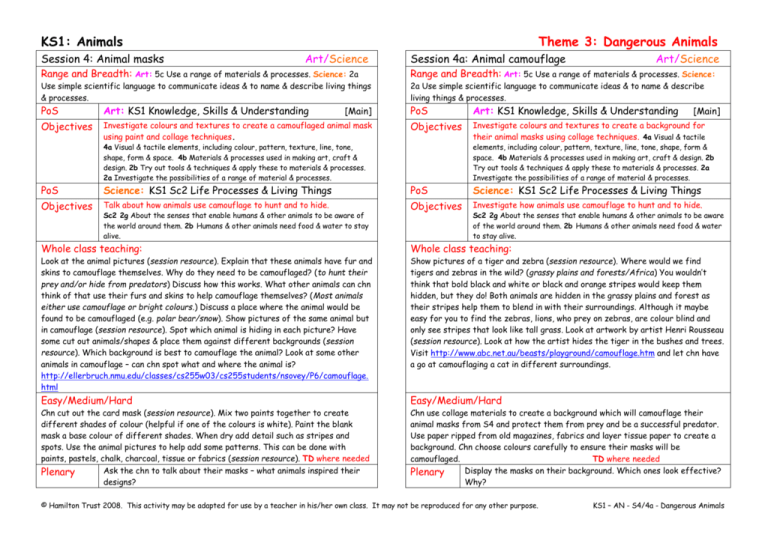
KS1: Animals Session 4: Animal masks Theme 3: Dangerous Animals Art/Science Session 4a: Animal camouflage Art/Science Range and Breadth: Art: 5c Use a range of materials & processes. Science: 2a Range and Breadth: Art: 5c Use a range of materials & processes. Science: PoS Art: KS1 Knowledge, Skills & Understanding PoS Art: KS1 Knowledge, Skills & Understanding Objectives Investigate colours and textures to create a camouflaged animal mask using paint and collage techniques. Objectives Investigate colours and textures to create a background for their animal masks using collage techniques. 4a Visual & tactile PoS Science: KS1 Sc2 Life Processes & Living Things PoS Science: KS1 Sc2 Life Processes & Living Things Objectives Talk about how animals use camouflage to hunt and to hide. Objectives Investigate how animals use camouflage to hunt and to hide. Use simple scientific language to communicate ideas & to name & describe living things & processes. [Main] 2a Use simple scientific language to communicate ideas & to name & describe living things & processes. 4a Visual & tactile elements, including colour, pattern, texture, line, tone, shape, form & space. 4b Materials & processes used in making art, craft & design. 2b Try out tools & techniques & apply these to materials & processes. 2a Investigate the possibilities of a range of material & processes. Sc2 2g About the senses that enable humans & other animals to be aware of the world around them. 2b Humans & other animals need food & water to stay alive. elements, including colour, pattern, texture, line, tone, shape, form & space. 4b Materials & processes used in making art, craft & design. 2b Try out tools & techniques & apply these to materials & processes. 2a Investigate the possibilities of a range of material & processes. Sc2 2g About the senses that enable humans & other animals to be aware of the world around them. 2b Humans & other animals need food & water to stay alive. Whole class teaching: Whole class teaching: Easy/Medium/Hard Easy/Medium/Hard Look at the animal pictures (session resource). Explain that these animals have fur and skins to camouflage themselves. Why do they need to be camouflaged? (to hunt their prey and/or hide from predators) Discuss how this works. What other animals can chn think of that use their furs and skins to help camouflage themselves? (Most animals either use camouflage or bright colours.) Discuss a place where the animal would be found to be camouflaged (e.g. polar bear/snow). Show pictures of the same animal but in camouflage (session resource). Spot which animal is hiding in each picture? Have some cut out animals/shapes & place them against different backgrounds (session resource). Which background is best to camouflage the animal? Look at some other animals in camouflage – can chn spot what and where the animal is? http://ellerbruch.nmu.edu/classes/cs255w03/cs255students/nsovey/P6/camouflage. html Chn cut out the card mask (session resource). Mix two paints together to create different shades of colour (helpful if one of the colours is white). Paint the blank mask a base colour of different shades. When dry add detail such as stripes and spots. Use the animal pictures to help add some patterns. This can be done with paints, pastels, chalk, charcoal, tissue or fabrics (session resource). TD where needed Ask the chn to talk about their masks – what animals inspired their Plenary designs? [Main] Show pictures of a tiger and zebra (session resource). Where would we find tigers and zebras in the wild? (grassy plains and forests/Africa) You wouldn’t think that bold black and white or black and orange stripes would keep them hidden, but they do! Both animals are hidden in the grassy plains and forest as their stripes help them to blend in with their surroundings. Although it maybe easy for you to find the zebras, lions, who prey on zebras, are colour blind and only see stripes that look like tall grass. Look at artwork by artist Henri Rousseau (session resource). Look at how the artist hides the tiger in the bushes and trees. Visit http://www.abc.net.au/beasts/playground/camouflage.htm and let chn have a go at camouflaging a cat in different surroundings. Chn use collage materials to create a background which will camouflage their animal masks from S4 and protect them from prey and be a successful predator. Use paper ripped from old magazines, fabrics and layer tissue paper to create a background. Chn choose colours carefully to ensure their masks will be camouflaged. TD where needed Display the masks on their background. Which ones look effective? Plenary Why? © Hamilton Trust 2008. This activity may be adapted for use by a teacher in his/her own class. It may not be reproduced for any other purpose. KS1 – AN - S4/4a - Dangerous Animals
